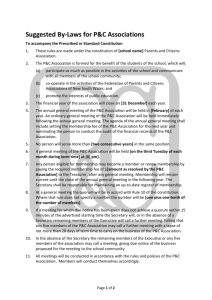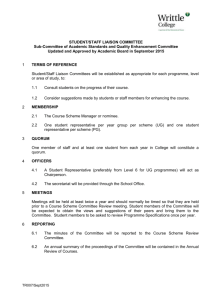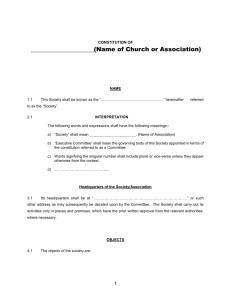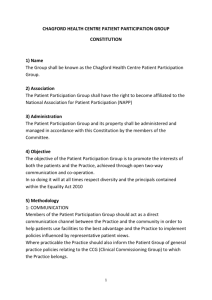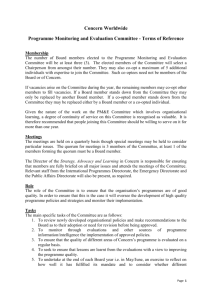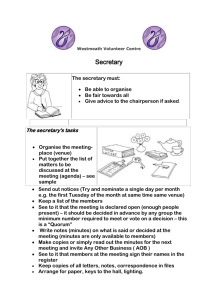DRAFT CONSTITUTION - Religious History Association
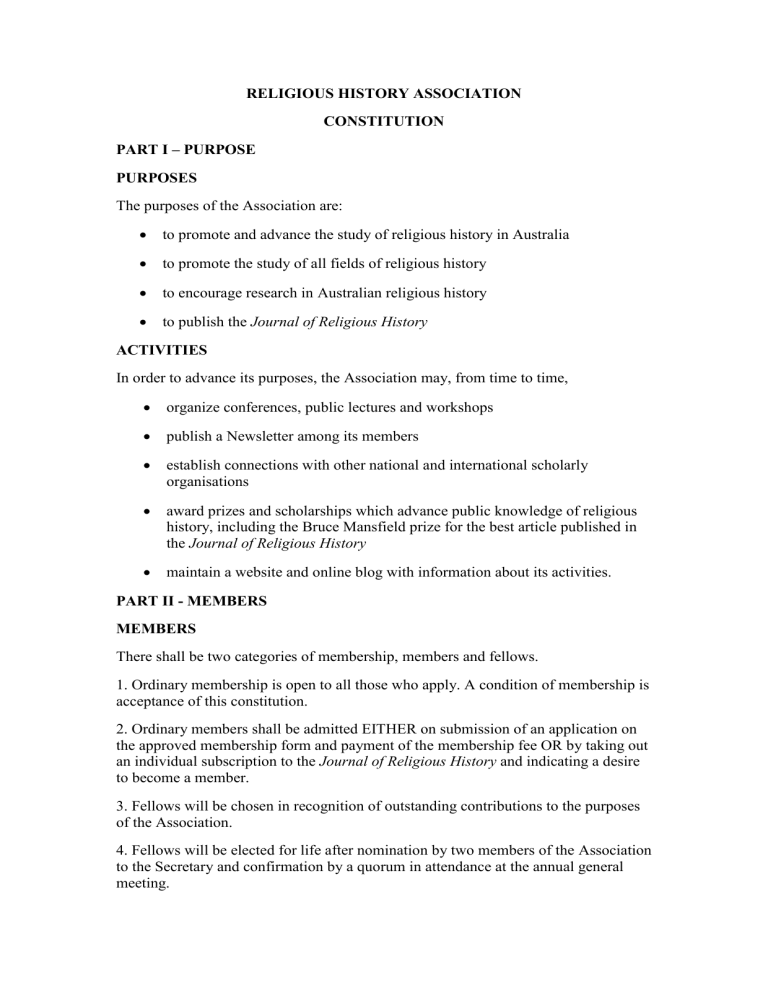
RELIGIOUS HISTORY ASSOCIATION
CONSTITUTION
PART I – PURPOSE
PURPOSES
The purposes of the Association are:
to promote and advance the study of religious history in Australia
to promote the study of all fields of religious history
to encourage research in Australian religious history
to publish the Journal of Religious History
ACTIVITIES
In order to advance its purposes, the Association may, from time to time,
organize conferences, public lectures and workshops
publish a Newsletter among its members
establish connections with other national and international scholarly organisations
award prizes and scholarships which advance public knowledge of religious history, including the Bruce Mansfield prize for the best article published in the Journal of Religious History
maintain a website and online blog with information about its activities.
PART II - MEMBERS
MEMBERS
There shall be two categories of membership, members and fellows.
1. Ordinary membership is open to all those who apply. A condition of membership is acceptance of this constitution.
2. Ordinary members shall be admitted EITHER on submission of an application on the approved membership form and payment of the membership fee OR by taking out an individual subscription to the Journal of Religious History and indicating a desire to become a member.
3. Fellows will be chosen in recognition of outstanding contributions to the purposes of the Association.
4. Fellows will be elected for life after nomination by two members of the Association to the Secretary and confirmation by a quorum in attendance at the annual general meeting.
5. A person ceases to be a member of the Association if the person:
(a) dies; or
(b) resigns membership; or
(c) is expelled from the Association; or
(d) fails to pay the membership fee by the due date or within a period laid down by the Committee
6. A member may resign from the Association in writing to the secretary.
FEES AND SUBSCRIPTIONS
7. A member of the Association must pay to the Association a membership fee as determined by the committee
MEMBERS’ LIABILITIES
8. The liability of a member of the Association to contribute towards the payment of the debts and liabilities of the Association or the costs, charges and expenses of the winding up of the Association is limited to the amount, if any, unpaid by the member in respect of membership of the Association as required by rule 7.
PART III -THE COMMITTEES
COMMITTEE OF MANAGEMENT
POWERS
9. The committee is to be called the committee of management of the Association and, (a) is to control and manage the affairs of the Association; and
(b) may exercise all such functions as may be exercised by the Association, other than those functions that are required by this constitution to be exercised by a general meeting of members of the Association; and
(c) has power to perform all such acts and do all such things as appear to the committee to be necessary or desirable for the proper management of the affairs of the
Association.
MEMBERSHIP
10. (1) The committee is to consist of:
(a) the office-bearers of the Association; and
(b) 2 ordinary members, each of whom is to be elected at the annual general meeting of the Association under rule 12.
(2) The office-bearers of the Association are to be:
(a) the president;
(b) the vice-president;
(c) the treasurer;
(d) the secretary; and
(e) The editor of the Journal of Religious History
(3) Each elected member of the committee is to hold office for two years.
(4) No office-bearer of the Association may serve more than four continuous two-year terms in any one office.
(5) In the event of a casual vacancy occurring in the membership of the committee, the committee may appoint a member of the Association to fill the vacancy and the member so appointed is to hold office, subject to this constitution, until the conclusion of the term of office of the person being replaced.
ELECTION OF MEMBERS
11. (1) Nominations of candidates for election as office-bearers of the Association or as ordinary members of the committee:
(a) must be made in writing, signed by 2 members of the Association and accompanied by the written consent of the candidate (which may be endorsed on the form of the nomination); and
(b) must be delivered to the secretary of the Association at least 7 days before the date fixed for the holding of the annual general meeting at which the election is to take place.
(2) If insufficient nominations are received to fill all vacancies on the committee, the candidates nominated are taken to be elected and further nominations are to be received at the annual general meeting
(3) If insufficient further nominations are received, any vacant positions remaining on the committee are taken to be casual vacancies to be filled, the persons nominated are taken to be elected.
(4) If the number of nominations received is equal to the number of vacancies to be filled, the persons nominated are taken to be elected.
(5) If the number of nominations received exceeds the number of vacancies to be filled, a ballot is to be held.
(6) The ballot for the election of office-bearers and ordinary members of the committee is to be conducted at the annual general meeting in such usual and proper manner as the committee may direct.
SECRETARY
12. (1) The secretary of the Association must, as soon as practicable after being appointed as secretary, lodge notice with the Association of his or her address.
(2) It is the duty of the secretary to keep minutes of:
(a) all appointments of office-bearers and members of the committee;
(b) the names of members of the committee present at a committee meeting or a general meeting; and
(c) all proceedings at committee meetings and general meetings.
(3) Minutes of proceedings at a meeting must be signed by the chairperson of the meeting or by the chairperson of the next succeeding meeting.
(4) The secretary will maintain the register of members and fellows of the
Association.
TREASURER
13. It is the duty of the treasurer of the Association to ensure:
(a) that all money due to the Association is collected and received and that all payments authorised by the Association are made; and
(b) that correct books and accounts are kept showing the financial affairs of the
Association, including full details of all receipts and expenditure connected with the activities of the Association and the Journal of Religious History .
THE EDITOR OF THE JOURNAL OF RELIGIOUS HISTORY
14. The Editor of the Journal of Religious History
(a) will be appointed for a two-year term by the committee on conditions specified by the committee; and
(b) will be a voting member of the management committee; and
(c) will serve a maximum of four continous two-year terms as Editor.
In addition, the Editor:
(a) will have complete editorial autonomy in deciding which articles to publish in the
Journal only ensuring that published articles meet the highest scholarly standards; and
(b) will conduct day-to-day negotiations with the publisher of the Journal on behalf of the Association; and
(c) will present a written report on the Journal which will be circulated to all members at least once a year.
CASUAL VACANCIES
15. For the purpose of this constitution, a casual vacancy in the office of a member of the committee occurs if the member:
(a) dies; or
(b) ceases to be a member of the Association; or
(c) becomes an insolvent under administration within the meaning of the
Corporations Law; or
(d) resigns office by notice in writing given to the secretary; or
(f) is absent without the consent of the committee from three successive meetings of the committee
MEETINGS AND QUORUM
16. (1) The committee must meet at least 2 times in each period of 12 months at such place and time or in such manner as the committee may determine.
(2) Additional meetings of the committee may be convened by the president or vice president
(3) Oral or written notice of a meeting of the committee must be given by the secretary to each member of the committee at least two weeks (or such other period as may be unanimously agreed on by the members of the committee) before the time appointed for the holding of the meeting.
(4) Notice of a meeting given under clause (3) must specify the general nature of the business to be transacted at the meeting and no business other than that business is to be transacted at the meeting, except business which the committee members present at the meeting unanimously agree to treat as urgent business.
(5) Any 3 members of the committee constitute a quorum for the transaction of the business of a meeting of the committee.
(6) A quorum may be made up by attendance either in person or by teleconference. If there is no quorum there may be a discussion of issues but any decisions will need to be ratified by a quorate meeting.
(7) At a meeting of the committee:
(a) the president or, in the president’s absence, the vice-president is to preside; or
(b) if the president and the vice-president are absent or unwilling to act, such one of the remaining members of the committee as may be chosen by the members present at the meeting is to preside
VOTING AND DECISIONS
17. (1) Questions arising at a meeting of the committee or of any sub-committee appointed by the committee are to be determined by a majority of the votes of members of the committee or sub-committee present at the meeting.
(2) Each member present at a meeting of the committee or of any sub-committee appointed by the committee (including the person presiding at the meeting) is entitled to one vote but, in the event of an equality of votes on any question, the person presiding may exercise a second or casting vote.
(3) Subject to rule 16(5), the committee may act despite any vacancy on the committee.
(4) Any act or thing done or suffered, or purporting to have been done or suffered, by the committee or by a sub-committee appointed by the committee, is valid and
effectual despite any defect that may afterwards be discovered in the appointment or qualification of any member of the committee or sub-committee.
JOURNAL OF RELIGIOUS HISTORY
18. The publication of the Journal of Religious History forms part of the core business of the Association and its committee of management which will be responsible for the appointment of the editor. If necessary, a Journal sub-committee may be established to consider:
the search for the Editor
appointment of the editorial board of the Journal
negotiating such publishing contracts as will best secure the continued publication of the Journal
other activities as may from time be determined by the committee of management.
PART IV – GENERAL MEETINGS
ANNUAL GENERAL MEETINGS – HOLDING OF
19. With the exception of the first annual general meeting of the Association, the
Association must, at least once in each calendar year and within the period of 6 months after the expiration of each financial year of the Association, convene an annual general meeting of its members.
ANNUAL GENERAL MEETING – CALLING OF AND BUSINESS AT
20. (1) The annual general meeting of the Association is, subject to rule 19, to be convened on such date and at such place and time as the committee thinks fit.
(2) In addition to any other business which may be transacted at an annual general meeting, the annual general meeting will:
(a) confirm the minutes of the last preceding annual general meeting and of any special general meeting held since that meeting;
(b) receive from the committee reports on the activities of the Association during the last preceding financial year;
(c) elect office-bearers of the Association and ordinary, members of the committee;
(3) An annual general meeting must be specified as such in the notice convening it.
NOTICE
21. (1) Except if the nature of the business proposed to be dealt with at a general meeting requires a special resolution of the Association, the secretary must, at least 21 days before the date fixed for the holding of the general meeting, cause to be sent to each member at the member’s email or other address appearing in the register of members, a notice specifying the place, date and time of the meeting and the nature of the business proposed to be transacted at the meeting.
(2) A member desiring to bring any business before a general meeting may give notice in writing of that business to the secretary who must include that business in the next notice calling a general meeting given after receipt of the notice from the member
PROCEDURE
22. (1) No item of business is to be transacted at a general meeting unless a quorum of members entitled under this constitution to vote is present during the time the meeting is considering that item.
(2) Five members present in person (being members entitled under this constitution to vote at a general meeting) constitute a quorum for the transaction of the business of a general meeting
(3) A quorum may be made up by attendance in person or by teleconference.
(4) If within half an hour after the appointed time for the commencement of a general meeting a quorum is not present, the meeting may continue as an ordinary meeting of the Association.
PRESIDING MEMBER
23. (1) The president or, in the president’s absence, the vice-president, is to preside as chairperson at each general meeting of the Association.
(2) If the president and the vice-president are absent or unwilling to act, the members present must elect one of their number to preside as chairperson at the meeting.
ADJOURNMENT
24. (1) The chairperson of a general meeting at which a quorum is present may, with the consent of the majority of members present at the meeting, adjourn the meeting from time to time and place to place, but no business is to be transacted at an adjourned meeting other than the business left unfinished at the meeting at which the adjournment took place.
(2) If a general meeting is adjourned for 14 days or more, the secretary must give written notice of the adjourned meeting to each member of the Association stating the place, date and time of the meeting and the nature of the business to be transacted at the meeting.
(3) Except as provided in clauses (1) and (2), notice of an adjournment of a general meeting or of the business to be transacted at an adjourned meeting is not required to be given.
MAKING OF DECISIONS
25. (1) A question arising at a general meeting of the Association is to be determined on a show of hands and, unless before or on the declaration of the show of hands a poll is demanded, a declaration by the chairperson that a resolution has, on a show of hands, been carried or carried unanimously or carried by a particular majority or lost, or an entry to that effect in the minute book of the Association, is evidence of the fact
without proof of the number or proportion of the votes recorded in favour of or against that resolution.
(2) At a general meeting of the Association, a poll may be demanded by the chairperson or by at least 3 members present in person or by proxy at the meeting.
(3) If a poll is demanded at a general meeting, the poll must be taken:
(a) immediately in the case of a poll which relates to the election of the chairperson of the meeting or to the question of an adjournment; or
(b) in any other case, in such manner and at such time before the close of the meeting as the chairperson directs, and the resolution of the poll on the matter is taken to be the resolution of the meeting on that matter.
SPECIAL RESOLUTION
26. A resolution of the Association is a special resolution: if it is passed by a majority which comprises at least three-quarters of such members of the Association as, being entitled under this constitution so to do, vote in person or by proxy at a general meeting of which at least 21 days’ written notice specifying the intention to propose the resolution as a special resolution was given in accordance with this constitution;
Any resolution concerning the viability of the continued publication of the Journal of
Religious History or a substantial change in the arrangements for the publication of the Journal of Religious History as declared to be such by the Committee shall require a special resolution of the Association.
VOTING
27. (1) On any question arising at a general meeting of the Association a member has one vote only.
(2) All votes must be given personally including by teleconference or by proxy but no member may hold more than 5 proxies.
(3) In the case of an equality of votes on a question at a general meeting, the chairperson of the meeting is entitled to exercise a second or casting vote.
(4) A member or proxy is not entitled to vote at any general meeting of the
Association unless all money due and payable by the member or proxy to the
Association has been paid, other than the amount of the annual subscription payable in respect of the then current year.
APPOINTMENT OF PROXIES
28. (1) Each member is to be entitled to appoint another member as proxy by notice given to the secretary no later than 24 hours before the time of the meeting in respect of which the proxy is appointed.
(2) The notice appointing the proxy is to be in the form set out in Appendix 1 to this constitution.
PART V – MISCELLANEOUS
FUNDS – SOURCE
29. (1) The funds of the Association are to be derived from annual subscriptions of members, income generated by the Journal, donations and, subject to any resolution passed by the Association in general meeting, such other sources as the committee determines.
(2) All money received by the Association must be deposited as soon as practicable and without deduction to the credit of the Association’s bank account.
(3) The Association must, as soon as practicable after receiving any money, issue an appropriate receipt.
FUNDS – MANAGEMENT
30. (1) Subject to any resolution passed by the Association in general meeting, the funds of the Association are to be used in pursuance of the objects of the Association in such manner as the committee determines.
(2) All cheques, drafts, bills of exchange, promissory notes and other negotiable instruments must be signed by any 2 members of the committee or employees of the
Association, being members or employees authorised to do so by the committee.
ALTERATION OF CONSTITUTION
31. This constitution may be altered only by a special resolution of the Association.
CUSTODY OF BOOKS
32. Except as otherwise provided by this constitution, the public officer must keep in his or her custody or under his or her control all records, books and other documents relating to the Association.
INSPECTION OF BOOKS
33. The records, books and other documents of the Association must be open to inspection, free of charge, by a member of the Association at any reasonable hour.
SERVICE OF NOTICES
34.For the purpose of this constitution, a notice may be served by or on behalf of the
Association on any member either personally or by sending it by post or email to the member at the member’s address shown in the register of members.
DISSOLUTION
35. In the event of the dissolution of the Association the continued publication of the Journal of Religious History shall have first claim on the resources of the
Association. The second claim shall be the fund for the award of the Bruce Mansfield
Prize and the biennial lecture in religious history at meetings of the Australian
Historical Association or a comparable scholarly Association. Other residual funds held by the Association at dissolution may be directed to ends consistent with the goals of the Association.
APPENDIX 1
(RULE 29 (2))
FORM OF APPOINTMENT OF PROXY
I, ................................................................................................................................
(full name) of
...................................................................................................................................
(address) being a member of the Religious History Association hereby appoint
.................................................................................................................................
(full name of proxy) of
..........................................................................................................................................
(address) being a member of the Association, as my proxy to vote for me on my behalf at the general meeting of the Association (annual general meeting or special general meeting, as the case may be) to be held on the ………………..…….day of ………………..……20 ……. and at any adjournment of that meeting.
* My proxy is authorised to vote in favour of/against (delete as appropriate) the resolution
(insert details).
* To be inserted if desired
……………………………………………
Signature of member appointing proxy
Date……………………….
Note: A proxy vote may not be given to a person who is not a member of the
Association.

